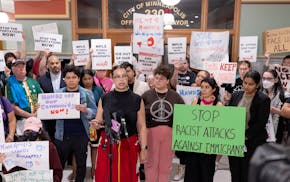Three men facing deportation crowded together at a table and faced a video monitor at the Freeborn County jail in southern Minnesota for their first appearance before Immigration Judge Sarah Mazzie.
One of them, an Ecuadorian national, said he would return to court in a few weeks after taking time to find a lawyer. The two others agreed to forgo legal representation and were sworn in.
Mazzie did not note a criminal record for Miguel Rodriguez-Escobar, who shows up in the Minnesota court system only for a 2023 citation of driving without a license in St. Paul; he had shown the officer his El Salvador identification card instead. After telling the judge he feared harm if he returned to his native country, Rodriguez-Escobar agreed to file an application to withhold deportation and come back in two weeks for another hearing.
The third man, Omar Blas Sanchez, pleaded guilty to criminal sexual conduct involving a minor in September. The father of three U.S.-born children came as a legal resident in 2022.
"I am ordering that you be deported from the United States to Mexico," Mazzie concluded.
As President Donald Trump's administration works to dramatically expand immigration detention, dozens of noncitizens jailed in rural Minnesota are videoconferencing each week into the Fort Snelling Immigration Court for hearings that determine whether they'll be set free or sent to their native countries. Such hearings offer an early glimpse into how the push for mass deportation is playing out in Minnesota.
[More: ICE moving detainees from rural Minnesota to Texas jail]
The detainees' time in the United States ranges from four months to more than 30 years, and they come from across Latin America and as far away as China. Some of the most serious criminals were brought into local ICE custody after serving about a decade in prison, including Jose Luis Argueta-Joj for sexually abusing a child and Mongong Kual Maniang Deng for attempted murder. But many other detainees appear to have nothing more than driving violations on their record or don't show up in criminal record searches at all. Others were released from the Hennepin County jail on bond only to be picked up by ICE before their other court proceedings finished.
Minnesota had 214 people in ICE detention before Trump took office, mainly in the jails of Kandiyohi and Freeborn counties, and the numbers are growing (60% had pending criminal charges or convictions). Officials aren't disclosing how many noncitizens were taken into custody locally in the last month, but observers say it's a new practice — at least in recent years — to have two or three people appear together for their first hearings, apparently to save time on a busy docket.
Mazzie remarked in court on Thursday that "the docket gets bigger and bigger."
While immigration court typically hears detained cases only on Wednesdays and Thursdays, it recently set aside Tuesday mornings for hearings for a surge in ICE detainees in the Sherburne County jail. The Elk River facility until recently had only several immigration detainees at a time, but a director at the Advocates for Human Rights said there are now 40 to 50 people being held there.
New law affects unauthorized immigrants arrested for theft
It will take some time to see the full effects of Trump's actions, and many cases originated before the president took office last month. Still, the court is already seeing changes.
Take the case of Henry Guano Guano.
He was arrested Jan. 9 for shoplifting $988 worth of laundry detergent from Target in Minnetonka and trying to flee police in the parking lot.
The Ecuadorian man, who has several other nonviolent theft charges, was released on bond. But he wasn't free for long: ICE arrested Guano Guano and brought him to the Kandiyohi County jail, an hour and a half west of Minneapolis. By the time he appeared virtually for a bond hearing before Mazzie this month, she said she had to keep him in jail due to the Laken Riley Act. The law enacted weeks after his alleged crime requires mandatory custody for unauthorized immigrants with theft arrests.
He pleaded for release, saying his wife needs his income while she watches their children. He said he was desperate.
"I have no choice," said Mazzie. "So even if you have really sympathetic factors in your life, I can't help you."
The Laken Riley Act has already affected a series of detainees, including one man arrested on larceny charges in South Dakota also denied bond. After Mazzie determined that Ecuadorian national Christian Guerrero Montenegro was subject to the law due to a Minnetonka theft arrest last June, the Freeborn County detainee said he wanted to withdraw his application for asylum and request deportation. "I have a little one that's dependent on me … since his mom passed away two years ago," he explained.
"He wants to be removed as soon as possible," said Guerrero Montenegro's attorney.
Mazzie granted his wish.
Other detainees were denied bond because of public safety reasons, including a Mexican man who overstayed his visa after meeting his fiancée. He was pulled over in Duluth — five days after Trump took office — for driving drunk at 111 mph.
'Get me deported'
Detainees rarely said they would appeal a deportation order.
Francisco Javier Salaya Rueda said he crossed the border illegally from Mexico in 2022 to flee extortionists who cut off part of his finger. He was pulled over Jan. 16 for driving without a valid license — the only charge the Minnesota Star Tribune could locate in the Minnesota court system — and wound up in ICE custody. Mazzie didn't mention any criminal record when she discussed his case. Told it would be four to six months to appeal the deportation order, Salaya Rueda agreed to accept the judge's decision.
While many immigrants are desperate to stay here and avoid ICE, it's not uncommon for them to ask for swift deportation once they are jailed and don't see a way out anytime soon. They'd rather be free abroad than locked up in the United States and usually cite sick or worried relatives in their homeland, families who need their financial support and the stress of being in jail.
"I would like you to help me out and get me deported to Colombia … I cry every day here," said one Kandiyohi County jail detainee, distraught at having to wait six weeks for his asylum hearing.
"I just want to get out of here," said Mexican Baltazar Gonzalez-Cortes, who arrived last May and overstayed his visa.
His proceedings went swiftly: Like many other respondents pleading for deportation, he waived his right to find a lawyer or seek alternate forms of relief.
Judges in Fort Snelling ask detainees a series of questions to determine whether they are eligible for various forms of relief to stop deportation. Do they have a child, parent or spouse who is a U.S. citizen? Had they been a victim of a crime that they reported to the police? Do they fear persecution upon returning to their country? Many were already past the one-year deadline to file for asylum but still eligible for an alternative called "withholding of removal."
Some immigrants grew agitated, saying the judge wasn't deporting them fast enough.
Guatemalan Roberto Panjo Tol dropped his head on the table in a gesture of despondency Feb. 6 when the judge could not immediately find an interpreter in the Indigenous language of K'iche' and postponed his hearing for a week. Returning Feb. 13, with an interpreter on the line, he told Mazzie, "I got in trouble, and I want to go home."
He entered this country in 2001 as a teen. He said he had been living on the streets for the last two years and called police for help after getting beat up. Officers took him to the hospital "and I ended up here," Panjo Tol said.
Mazzie said police found him with drugs, though Panjo Tol denied it.
"I am having a hard life," he explained.
As Panjo Tol pleaded to be sent back, Mazzie said she could not order him deported until she decided whether he needs help. She set a hearing to evaluate his mental competency.
Another detainee, Savriddin Nurov, sobbed and said via a Russian interpreter that he could never forgive himself if he didn't get out in time to see his father before he died. ICE jailed him after he was released on bond for a Jan. 16 domestic assault arrest in Fridley. He wanted to drop his asylum case and pleaded, "Just deport me," but voiced so much anguish and confusion that Mazzie told him she would see him next week so he could talk more with his attorney.
Ordered deported after criminal arrest
On Jan. 30, three men gathered in the Kandiyohi County Jail and faced the camera to listen to Immigration Judge Ryan Wood.
Edison Padilla-Nieto asked if he could be released on bond, saying he had a wife and newborn in Minneapolis who needed his income. The Ecuadorian said he entered the country unlawfully in 2001 and 2010 and was arrested in December on a 2008 warrant for criminal sexual conduct involving a child.
He had already been released on bond in the criminal case, for which Padilla-Nieto said he had a court date in March.
"Please, help me out for my wife and my children's sake — they don't have money to pay the rent right now."
The judge denied his request, saying the allegations against him were very serious. Padilla-Nieto asked to be deported after Wood said the appeal process can be lengthy. Wood explained that he could also file for a U visa, a status granted to victims of some crimes since he reported recently being carjacked. But by the time he appeared before Mazzie the following week, Padilla-Nieto dropped the idea.
He voiced concern that his parents were sick in Ecuador, he had a baby, and it wasn't doing anyone any good for him to be locked up.
Mazzie ordered him deported and wished him good luck.
"OK, thank you," Padilla-Nieto said. "God bless."

How the federal raid unified the fractious Minneapolis City Council against Trump, sort of
Trump travel ban 'cruel,' Minnesota advocacy group says

Minneapolis City Council lowers street food cart license fee, hoping fruit sellers will hawk legally

No verdict after first day of jury deliberation in Derrick Thompson murder trial for crash that killed 5
